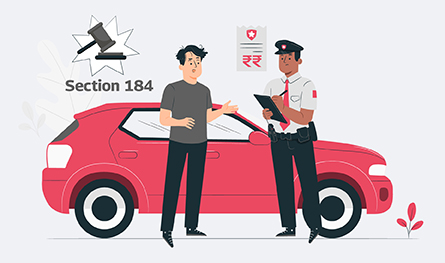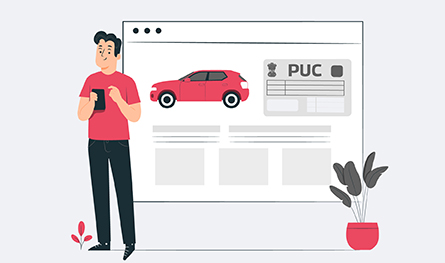Related Articles
 Jan 08, 2025
Jan 08, 2025
Is Varicose Vein surgery covered under the health insurance policy in India
 Health Insurance
Health Insurance

Copayment is a fixed percentage of a claim that health insurance policyholders agree to pay from their pocket at the time of claim settlement. This percentage may vary between 10 – 30% of the total claim amount depending on the health insurance policy. Keeping a tab on the co-pay clause is important while buying a health plan

As stated, a co-pay is the fixed percentage of claim money that policyholders have to pay from their pocket during the time of a claim settlement. Co-payment is like an arrangement between the insurer and the insured wherein the insured pays a certain percentage of the medical expenses, whereas the remaining claim amount is paid by the insurance company as per the applicable terms and conditions of your policy. For instance, if your pre-determined co-pay is 10% on your health insurance policy and the claim amount is INR 2 lakh, your insurer will pay INR 1.8 lakh, while the remaining INR 20,000 will be paid from your pocket. It is important to note here that the co-pay amount is one of the determinants that decides the premium of your health insurance policy. Co-pay reduces your premium considerably. Voluntary and compulsory are the two forms of co-pay available in health insurance policies. In voluntary co-pay, the policyholder can decide to pay a portion of the amount, whereas mandatory or compulsory co-pay is levied by the insurer. Co-pay can vary from 10% to 30% depending on the policy and the insurer. Most senior citizen health insurance plans come with a co-pay.
Co-payment and Deductibles are two different features of a health insurance plan. Co-pay, as discussed, is a fixed percentage of the claim amount, while deductible is the fixed sum of money that the insured has to pay at the time of every claim settlement. The percentage of the co-pay is mostly specified in the policy document of your insurance plan. On the other hand, the deductible to be paid is calculated yearly. However, the policyholder has to clear these charges in a claim settlement before availing insurance coverage. Further, co-payment, in most cases, is applied to specific diseases where the treatment cost is very high, or if the treatment requires the insured to go to non-network hospitals. On the contrary, deductibles apply to the overall medical costs.
As soon as a policyholder raises a claim, the co-pay gets activated. So, once you raise a claim, you must pay the co-pay amount before the insurer settles the rest of the claim. Unless the policyholder pays the copay amount, the remaining amount is not settled by the insurer. Is
There are many benefits of buying health insurance policies with a Co-pay clause. Let us take a look at some of them:
Every health insurance provider may not include a co-pay clause in their policies. Moreover, co-pay has many shortcomings or drawbacks, which makes policyholders look for insurance policies without a co-pay clause. Below are some drawbacks of co-pay in insurance.
Whether to buy a health insurance policy with or without a co-pay depends on the health condition of the insured. If you are willing to buy a health plan with a co-pay clause, you may consider the presence of any health issues or any medical history. If you are a young and healthy person following a healthy lifestyle, diet, and exercise, the chances of falling sick are likely less compared to others. In such cases, it may suit you to buy health insurance policies with a co-pay clause.
However, people with a sedentary lifestyle and who are aging might like to avoid a co-pay clause in their health plans. They may have to avail of medical treatment and raise claims. So, they may like to avoid co-pay and go for regular health policies.
A co-pay in medical billing is the fixed percentage of money that policyholders have to pay from their pockets during the time of a claim settlement.
Co-pay is not a compulsory feature of health insurance but most policy providers like to levy a co-pay amount on the insured for availing health insurance plans.
Yes, the co-pay does impact the premium payment of your health insurance plan. The more the co-pay amount, the lower the premium you pay.
People generally prefer the copay clause in health insurance plans to lower the premium payment of the policy.
You can refer to your health insurance policy document to know the co-pay percentage that you would have to pay at the time of claim settlement.

Paybima Team
Paybima is an Indian insurance aggregator on a mission to make insurance simple for people. Paybima is the Digital arm of the already established and trusted Mahindra Insurance Brokers Ltd., a reputed name in the insurance broking industry with 17 years of experience. Paybima promises you the easy-to-access online platform to buy insurance policies, and also extend their unrelented assistance with all your policy related queries and services.

Fixed Deposits (FDs) remain one of the most popular investment options in India, offering assured returns with minimal risk. In 2025, Bank of Baroda (BOB), one of the country’s most trusted public sector banks, continues to provide competitive interest rates on fixed deposits, catering to both short-term and long-term investors.

.png)
As per the new mandate by the Central Government, it is imperative for all motor vehicles manufactured and sold after 2020 to comply with BS6 engine norms as against the current BS4 being used. Here’s what has changed moving forward.


When you drive your vehicle on the road it becomes necessary to drive safely to ensure that you do not hurt any commuters on the road with your acts of dangerous driving. Section 184 of the Motor Vehicles Act discusses the penalties imposed on vehicle drivers for driving dangerously on the road. Read on further to know all about section 184.

.png)
As humans, we all have a name for an identity, and the same vehicles have a registration number. These four-digit vehicle registration numbers are issued by Regional Transport Office or RTO in random order. However, some people are interested in getting the so-called VIP number plates for their vehicles.


A PUC or pollution under control certificate is an important requirement for a vehicle in India. Every vehicle should go through a PUC check to know if the pollution emitted by the motor is under the specified limits set by the government. To check your vehicle’s pollution certificate status online in India several methods can be used. This article discusses the ways to check the PUC status of vehicles online.
